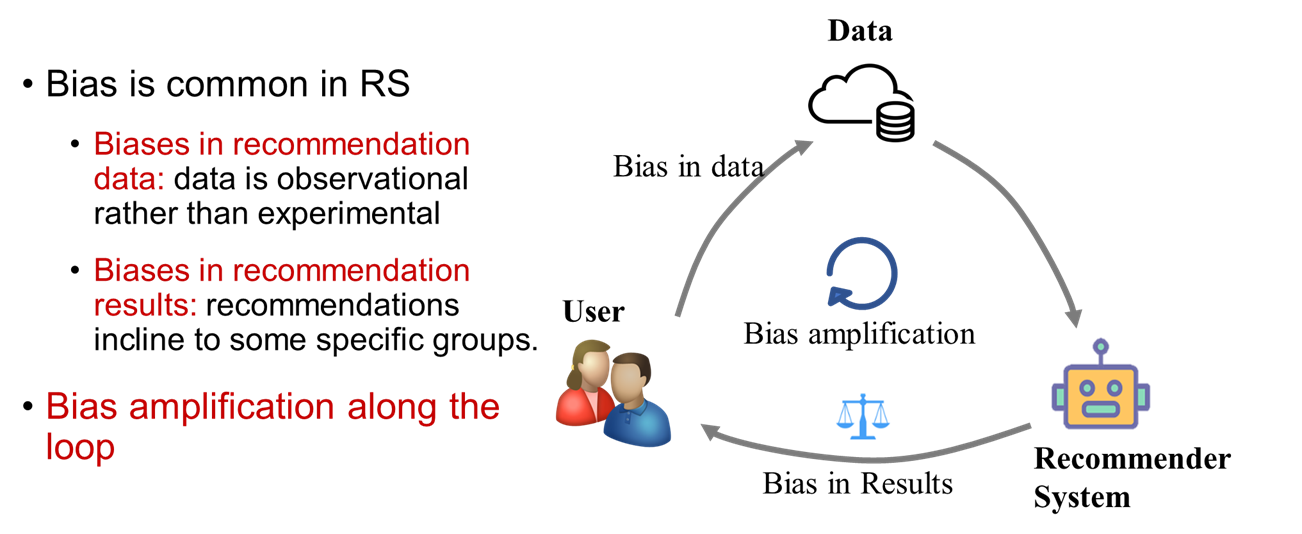Abstract
Recommender systems (RS) have demonstrated great success in information seeking. Recent years have witnessed a large number of work on inventing recommendation models to better fit user behavior data. However, user behavior data is observational rather than experimental. This makes various biases widely exist in the data, including but not limited to selection bias, position bias, exposure bias. Blindly fitting the data without considering the inherent biases will result in many serious issues, e.g., the discrepancy between offline evaluation and online metrics, hurting user satisfaction and trust on the recommendation service, etc. To transform the large volume of research models into practical improvements, it is highly urgent to explore the impacts of the biases and develop debiasing strategies when necessary. Therefore, bias issues and solutions in recommender systems have drawn great attention from both academic and industry.

Presenters
Jiawei Chen, Xiang Wang, Fuli Feng, Xiangnan He
Date and time
April 14, 2021, 2:00PM-5:30PM, CEST
Agenda
PART 0: Background (20 min)
PART 1: Biases in data (50min)
————– have a rest for 10 min
PART 2: biases in recommendation results (90 min)
PART 3: Bias amplification in loop and its solutions (10 min)
PART 4: Summary and future direction (20 min)
Link to the session:
https://theweb.miteam.eu/asset/HQ4TwQDAummwy3Qqp
The slide is available at:
https://github.com/jiawei-chen/RecDebiasing
Tutorial intended for:
(1) who are new to the bias issues and look for a tutorial to fast step into this area;
(2) who are confused by different bias definitions in the literature and need a tutorial to understand the biases;
(3) who face bias issues in building recommender systems and look for suitable solutions.
Bios of Presenters
Jiawei Chen is a Postdoc Research Fellow in School of Information Science and Technology, University of Science and Technology of China. He received Ph.D. in Computer Science from Zhejiang University in 2020. His research interests include information retrieval, data mining, and causal inference. He has published some academic papers on international conferences such as WWW, AAAI, CIKM, ICDE and ICDM. Moreover, he has served as the PC member for toptier conferences including SIGIR, WWW, ACMMM, AAAI, IJCAI and the invited reviewer for prestigious journals such as TNNLS, TKDE, TOIS.
Xiang Wang is now a research fellow at National University of Singapore. He received his Ph.D. degree from National University of Singapore in 2019. His research interests include recommender systems, graph learning, and explainable deep learning techniques. He has published some academic papers on international conferences such as KDD, WWW, SIGIR, and AAAI. He serves as a program committee member for several top conferences such as SIGIR and WWW.
Fuli Feng is a Research Fellow in the School of Computing, National University of Singapore (NUS). He received Ph.D. in Computer Science from NUS in 2019. His research interests include information retrieval, data mining, and multi-media processing. He has over 30 publications appeared in several top conferences such as SIGIR, WWW, and MM, and journals including TKDE and TOIS. His work on Bayesian Personalized Ranking has received the Best Poster Award of WWW 2018. Moreover, he has been served as the PC member for several top conferences including SIGIR, WWW, WSDM, NeurIPS, AAAI, ACL, MM, and invited reviewer for prestigious journals such as TOIS, TKDE, TNNLS, TPAMI, and TMM.
Xiangnan He is a professor at the University of Science and Technology of China (USTC). His research interests span information retrieval, data mining, and multi-media analytics. He has over 90 publications in top conferences such as SIGIR, WWW, and MM, KDD, and journals including TKDE, TOIS, and TMM. His work has received the Best Paper Award Honorable Mention in WWW 2018 and SIGIR 2016. He is in the Editorial Board of the AI Open journal, served as the PC chair of CCIS 2019, the area chair of MM 2019, ECML-PKDD 2020, and the (senior) PC member for top conferences including SIGIR, WWW, KDD, WSDM etc.